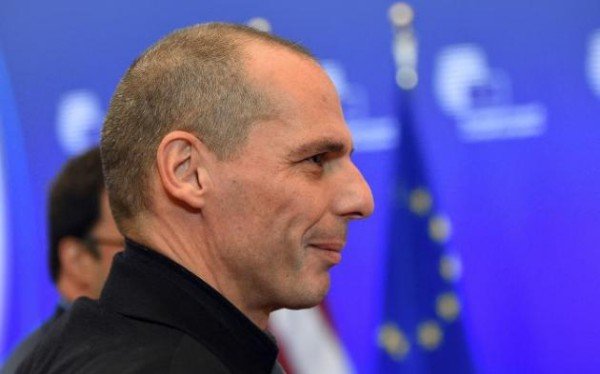Greece’s stock market falls by 4% as European finance ministers fail to reach new debt deal
The Greek stock market fell by more than 4% at its open on Tuesday, February 17, after European finance ministers failed to reach a new deal to restructure the country’s debts.
Greek bank shares fell almost 9%, while the government’s borrowing costs rose, with the yield on a 10-year sovereign bond rising 82 basis points to 10.74%.
On Monday night, Greece rejected a plan to extend its €240 billion bailout.
Greek Finance Minister Yanis Varoufakis called the EU deal “absurd” and “unacceptable”.
However, Yanis Varoufakis declared he was ready to do “whatever it takes” to reach agreement over Greece’s bailout, despite the collapse of the talks.
He also said he was prepared to agree a deal under different conditions.
The Greek stock exchange recovered some ground as the day progressed, but at midday on Tuesday in Athens, it was still 2.25% lower.
Stock exchanges across Europe all fell in morning trade before recovering.
Germany’s main index, the Dax, was 0.35% lower and France’s blue chip index, the CAC-40, down 0.19% at mid-day.
In the UK, which has less exposure to Greece’s debt woes, the FTSE 100 Index which also started the day lower, had risen 0.45% by lunchtime.
JP Morgan claimed over the weekend that €2 billion worth of deposits was flowing out of Greek banks each week and estimated that if that were to remain the case, they would run out of cash to use as collateral against new loans within 14 weeks.
The investment bank’s estimate is based on a calculation that a maximum of €108 billion of deposits is left in Greek banks.
The most up-to-date figures from the Greek central bank show deposits dropped 2.4% month-on-month in December to €160.3 billion from €164.3 billion, marking the third monthly fall in a row.
Dutch Finance Minister Jeroen Dijsselbloem, who is also chairing the Eurogroup meetings of eurozone finance ministers, warned on Monday night there were just days left for talks.
Jeroen Dijsselbloem said it was now “up to Greece” to decide if it wanted more funding or not.
Ahead of Tuesday’s meeting, he said: “I hope they [Greece] will ask for an extension to the program, and once they do that, we can allow flexibility, they can put in their political priorities.
“Of course, we will see whether their program remains on track. But that is the way forward. It’s really up to the Greeks. We cannot make them or ask them. It really it really is up to them. We stand ready to work with them, also [over] the next couple of days.”
Greece’s current bailout expires on February 28. Any new agreement would need to be approved by national governments, so time is running out to reach a compromise.
Without a deal, Greece is likely to run out of money.
On Tuesday morning, Luxembourg’s Finance Minister, Pierre Gramegna, called for a greater degree of compromise on both sides.
“We can’t remain in a blockade, so everyone has to move a bit, water down demands, so we can find a compromise. There are flexibilities in the program, we have to make use of them,” he said.
“When the Greeks are against the programme and don’t want to work in this framework, it will be tough.”
Yanis Varoufakis said on Tuesday ministers would “continue to deliberate”, in order to enhance the chances of a deal.
He added he wanted to achieve “a very good outcome for the average European. Not for the average Greek, the average Dutch person or the average German”.
“We know in Europe how to deliberate in such a way as to create an honourable solution out of an initial disagreement,” Yanis Varoufakis said.
Greece has proposed a new bailout program that involves a bridging loan to keep the country going for six months and help it repay €7 billion of maturing bonds.
The second part of the plan would see Greece’s debt refinanced. Part of this might be through “GDP bonds” – bonds carrying an interest rate linked to economic growth.
Greece also wants to see a reduction in the primary surplus target – the surplus the government must generate (excluding interest payments on debt) – from 3% to 1.49% of GDP.
Two opinion polls last week indicated that 79% of Greeks supported the government’s policies, and 74% believed its negotiating strategy would succeed.
